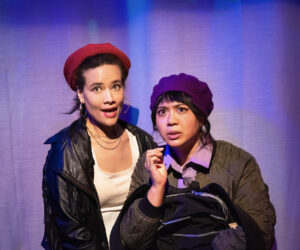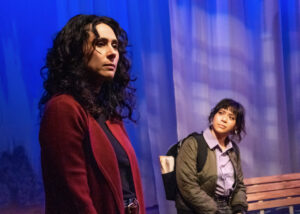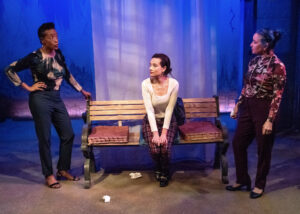Getting There
Dipika Guha
New Conservatory Theatre Center

As a young woman sits on a bench alone, each of four other women of varied generations approach her with highly dramatic outreach motions, lip-singing Edith Piaf’s “Non, Je Ne Regrette Rien,” or in English translation, “No, I Don’t Feel Sorry about Nothing.” As they continue to bombard her with their emotional confessions (“I don’t feel sorry about the good things … not the bad things …I’m happy of the past”), she finally joins a collective, lip-sung finale of “I don’t feel sorry about nothing because my life, my joys today, they begin with you.”
Director Nailah Harper-Malveaux introduces this pantomimed, musical prelude that both sets an appropriate dreamy, romantic, and mysterious tone and provides a strong hint of how the wandering, loosely coupled scenes of Dipika Guha’s new play, Getting There, will conclude. Now in a world premiere production commissioned by New Conservatory Theatre Center, Getting There is a slice-of-life peering into specific moments of one day in the lives of five women in Paris, France, with periodic back-tracks through the three days past. Chance meetings in a Parisian sidewalk café and in the waiting room of a train station open doors for women in their twenties, thirties, and fifties to find new avenues to face and deal with such issues as separation, loneliness, search for love, and the certainty of death.
The sixth, non-speaking character of Dipika Guha’s play is Paris itself; but it is a character that we see only displayed in light (Justin Partier, designer) and abstract projections (Alexa Burrell aka LEXAGON) on layers of flowing curtains of sheer material. Somehow, we soon understand that the reflections, insights, and interactions we witness maybe can only take place in Paris; with each of us adding to this sixth character’s description our own experiences, images, and/or dreams about Paris itself.
 Twenty-something, American Julie (Lauren Andrei Garcia) has come to Paris to see everything, sent via the life savings of a mother who wants her to experience the city that she herself has never been able to see. Julie is there with her best friend – twenty-something and fellow American, Kai (Leigh M. Marshall) – who has been to Paris many times and has little interest to see once again any of the sights that Julie has marked as her must-sees on the Paris Metro map that is rarely out of her hands. Julie wants to visit the Eifel Tower; Kai takes her instead to the grave of Jim Morrison, with whom she converses in a pleading prayer for help and advice about her life. Kai is soon to tell Julie she is leaving to go back to the U.S. in order to marry a boyfriend who proposed to her over email at the beginning of their trip. Julie is stunned, for she comes to realize she not just likes but actually loves this girl friend of many years.
Twenty-something, American Julie (Lauren Andrei Garcia) has come to Paris to see everything, sent via the life savings of a mother who wants her to experience the city that she herself has never been able to see. Julie is there with her best friend – twenty-something and fellow American, Kai (Leigh M. Marshall) – who has been to Paris many times and has little interest to see once again any of the sights that Julie has marked as her must-sees on the Paris Metro map that is rarely out of her hands. Julie wants to visit the Eifel Tower; Kai takes her instead to the grave of Jim Morrison, with whom she converses in a pleading prayer for help and advice about her life. Kai is soon to tell Julie she is leaving to go back to the U.S. in order to marry a boyfriend who proposed to her over email at the beginning of their trip. Julie is stunned, for she comes to realize she not just likes but actually loves this girl friend of many years.
The above part of the story is revealed in scenes that travel from the day of the separation back through the preceding three days, interspersed with numerous other scenes of Julie’s and Kai’s chance meetings with the other three principals of the play. Those encounters lead both Julie and Kai as well as the women they meet through a few hours in one day where conversations full of personal philosophy and sudden confessions; where new, exciting, and unexpected attractions to strangers; and where realizations of what is being desperately searched is actually right at hand all lead to Pilaf’s conclusion, “my joys today, they begin with you.”

Julie’s chance meeting is with thirty-something, French-born Ira (Laura Domingo), who is sipping wine at a sidewalk café. Julie, who has just learned of Kai’s departure, is immediately excited to see “a woman drinking wine … so romantic, so Paris.” Ira becomes intrigued with this giddy-about-Paris American, taking her on almost like a project to re-educate her about what is means to be a woman. She entices her to experience ‘being alone,’ seeing loneliness as a woman’s new privilege in the modern world, one to be savored. “If women are not alone, then we slide back in time … It means we are giving up … not moving forward.” But the irony of their meeting is that being together and not alone allows each to be open to the next steps they need to take in their lives. Both Julie and Ira in the end find new possibilities during their hours together with little, forced agenda while listening non-judgmentally to the other and while sometimes, just being there in silence as the other faces a deep sadness. As the one advocating loneliness, meeting Julie is exactly what Ira needs in order to face a monumental day of an upcoming loss and to face both her sadness, her guilt, and her responsibility for a mother who is in early Alzheimer’s.
In the meantime, Kai has made her way to the Paris train station, a place she comes often hoping to find a mother who left her family in the past and whose only communication with her daughter was a letter sent one year earlier from this very station. During this visit, Kai keeps coming to the station to see if she sees someone who resembles how she remembers her mom.
During this particular visit, she first meets fifty-something Anissa (Simone Bloch) and then the wife that Anissa is there to meet, fifty-something Radha (Desiree M. Rogers), both French. It does not take long for either Kai or us to realize this couple of twenty-six years – who have been married for only three months – are in the midst of some serious, relationship issues. Anissa is suspect of Radha’s immediately liking of the younger Kai, who is clearly taken with the older woman’s interest in her.

As she readily accepts an invitation by Radha (much to Anissa’s irritation) to come home with them, Kai in many ways is following the advice she earlier had given Julie: “Who knows what doors could open for us if we’d just stop going to the doors we know are going to be open.” The finacé waiting in America for Kai (her current, open door) is clearly now the furthest thing from her mind as she appears to relish suddenly being in the middle of a stormy relationship, with one half of that coupling actively flirting with her in manners quite coquettish. But what neither Kai nor Radha quite understands yet, the door that each needs to go through to be with the one each needs to be with is a door that has been in front of them all along waiting to be opened.
Each of the members of this ensemble captures well the five, distinct personalities that the playwright has deemed for the women we meet. No one dominates the others. No one is the star; but all provide exceedingly worthy performances that add up to a collective sum that exceeds any one member’s efforts.
Getting There is not the easiest of plays to follow as the many, short scenes fade from one to the other in its relatively short 80-minute duration, each scene sometimes only covering a few minutes of the primary day of focus. Scenes connect by a ringing, unanswered phone or a skillet pitched in anger from a window; but it is not always easy in the moment to understand those connections. A sudden burst of tears by Ira that leads to a hysteric outburst of bawling where no lines of dialogue provide a clue as to the cause can leave us as audience wondering from where comes that sudden sadness. But when we watch Kai simply being there to witness without judgment or intervention, there is a hint that perhaps we too must be patient a little longer in order to understand.
Almost like a play of mystery, clues in subsequent scenes of Getting There begin to point to some conclusions of what has happened – along with how and why – in earlier ones; but I also find this is a play where more clarity of what really occurred comes the next day after much re-thinking and after a good, follow-up conversation with my evening companion.
Rating: 3.5 E
Getting There continues through February 26, 2023, in world premiere performance by New Conservatory Theatre Center, Walker Theatre, 25 Van Ness Avenue, San Francisco. Tickets are available online at https://www.nctcsf.org. Please note, masks are required of all audience members during the performance.
Photo Credits: Lois Tema
